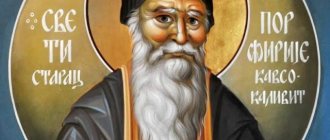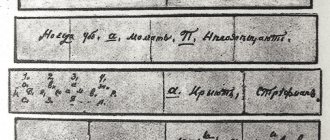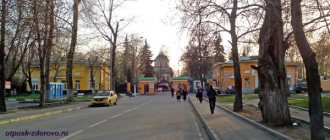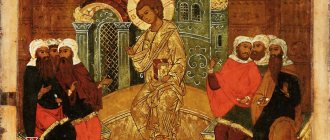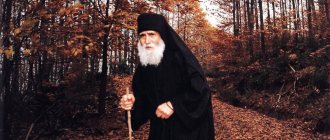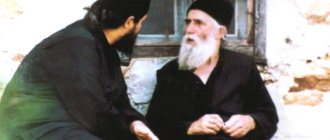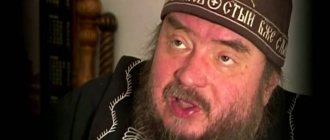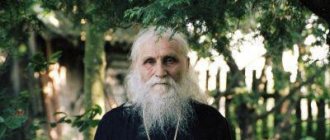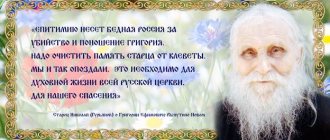On the way to asceticism
The Monk Porfirios Kavsokalivit (secular name: Evangelos Bairaktaris) was born on the territory of Greece, in the province of Evia, near Aliveri, on February 7, 1906.
Evangelos' parents were simple peasants, poor but pious. From early childhood they taught him to believe.
They, of course, also wanted a good secular education for their son. However, due to insufficient funds, they could not provide him with full training. As a result, his entire stay at school was limited to two classes.
From childhood, Evangelos was accustomed to work: he worked around the house, tended cattle, and worked in the garden. At the age of 8 he began working in a mine, and after some time he stood behind a sales counter.
In his youth, he became acquainted with the life of the holy saint of God, John Kushchnik. Evangelos was so touched by this heartfelt narrative that he himself decided to devote himself to God and go to Athos. He made several attempts to enter into a new life, but each time he was prevented by some circumstances.
He was able to reach the Holy Mountain only at the age of 14 (or 15 years).
What do they pray to the Saint for?
The Great Elder Porfiry is one of the most famous Saints of the 20th century.
He was distinguished by his special love for people, long-suffering, non-covetousness, meekness, and humility.
Father radiated kindness, which, like the rays of the sun, warmed everyone around him. He was perspicacious, and through his holy prayers people received healing.
In his instructions, the Rev. more than once emphasized that it is necessary to ask the Lord, first of all, for mental prayer, patience with sorrows, humility, and not for healing and deliverance from sorrows. Since a person is cleansed through sorrows and illnesses and receives many benefits from them.
You can contact him with various requests. He often healed people while alive and continues to do so from the heavenly kingdom. The holy elder Porfiry helps to endure sorrows without complaint and to be steadfast in the faith, to find the right path and not to turn away from it.
Troparion and Kontakion to St. Porfiry
Video: Porfiry Kavsokalivit about prayer
Athos
When Evangelos was sailing on a ship towards Athos, he met an experienced ascetic, Hieromonk Panteleimon. He, having learned about the young man’s desire, agreed to accept him under his spiritual care. He also helped him with the arrangement on the Holy Mountain: due to his youth, Evangelos could have been denied his request; To avoid this, Father Panteleimon gave him away as his nephew.
Panteleimon gave Evangelos shelter in his cell in Kafsokalyvia, where his brother, Father Ioannikios, was already asceticizing. Thus, according to the Providence of God, young Evangelos found two spiritual mentors at once.
The monastery "Kavsokalyvia" consists of forty kaliva (a house in a monastery in which one or more monks live) and is located at the southern tip of the Athos peninsula, on the rocks, towards the Great Lavra. The name “Kavsokalivia” (translated as “arsonist of huts”) was established on behalf of the Monk Maxim Kavsokalivit († 13 Jan. 1365), who built huts for himself on these rocks. His love for solitude was so great that whenever other monks settled next to his kaliva, he burned his house, climbing higher and higher into the mountain, where he built himself a new hut.
With the blessing of the fathers and to the best of his own strength, the ascetic tried step by step to intensify his exploits: he prayed a lot; he slept little, and the hard floor served as his bed; I walked barefoot in winter and summer. Fulfilling obedience, he chopped wood, carved wood, carried soil for gardens, and collected snails.
Having passed the test of difficulties and temptations, having strengthened spiritually, Evangelos was tonsured a monk with the name Nikita.
Icon of Porfiry Kavsokalivit
As a rule, in order to appeal to one or another heavenly patron saint, it is necessary that there be his Image in the house.
The icon of Porfiry Kavsokalivit will help you address the Holy Ascetic as a living person.
This great ascetic of piety lived quite recently. In fact, he is our contemporary and he is familiar with current troubles, modern life with its temptations, etc. During his lifetime, young men and women often came to the Holy Elder with their problems and hobbies in the spirit of the times, he often gave instructions to their parents, etc.
The holy image of Porfiry, even in the image on the icon, conveys his boundless love and mercy for people. Therefore, a fervent heartfelt prayer before the image of Saint Porphyry will certainly be heard by the ascetic, and his Holy help will not be long in coming.
Monastic life
Having taken monastic vows, Nikita began to serve God with even greater zeal and dedication. He repeatedly experienced the joy of a living sense of the Divine presence. It seemed that he could no longer imagine life outside of asceticism on the Holy Mountain.
Meanwhile, walking barefoot in winter and sleeping with an open window on a cold floor led to pneumonia. In turn, this disease turned into pleurisy. Taking into account the seriousness of the illness, the elders ordered him to leave Athos and go for treatment. No matter how hard it was for him to part with Athos, he submitted to their will and moved to the mainland.
After undergoing a course of necessary health procedures, Nikita returned, but soon the illness made itself felt again. Realizing that the Athos climate had a bad effect on his fragile health, and that the worsening of the disease could result in quick death, the elders again blessed him to leave the Holy Mountain, but this time they did not bless him to return.
At the age of 19, Nikita left the land he loved and moved to the monastery of Saint Charalampius, located not far from his native village. Here he continued to live a strict ascetic life, but his failing health did not allow him to fully practice the rule of especially strict fasting.
Once, the monastery where Nikita labored was visited by Archbishop Porfiry, the head of the Sinai Church. Having assessed the experience and spiritual disposition of the young monk, he elevated him to the rank of hierodeacon, and the next day ordained him a priest. Moreover, Nikita received a new name: Porfiry. This happened in 1927. Father Porfiry was then only 22 years old.
Miracles
The Lord rewarded Father Porfiry Kavsokalivit with an abundance of spiritual gifts. Meekness, love for people and God, insight, the power of prayer for the healing of soul and body - all this was inherent in the elder. With one touch of his, many got rid of serious illnesses that had tormented them for years.
Gift of finding water
The elder was very close to nature and felt its beauty and depth like no one else. He understood the language of birds, and he could read the depths of the earth and the abysses of the sea like an open book. One day, residents of a mountain village turned to him for help because they could not find a place where they could dig a well. We contacted various authorities, but everyone unanimously insisted that there was no groundwater in these places. To meet their needs, the villagers had to collect precipitation after the rain, which is how they survived.
Icon of Saint Porphyry Kavsokalivit
One person, who was the spiritual child of Elder Porfiry and knew about his amazing abilities, including finding water deep underground, asked for help in this situation. The elder answered without hesitation that in the area where the village was located there was a lot of good water, and immediately pointed out on the map where to look. At the request of people, he himself went to this place and determined exactly where to drill a well.
Gift of Serendipity
Mother o. Porphyria was very ill and had been in the Athens hospital for several days. The doctors gave a good prognosis and promised to discharge me in a few days. The brother, who visited his mother, called Fr. Porfiry with the good news of a speedy recovery. But then, after a short time, there was a call back, this time from Father Porfiry. He told his brother that he needed to hurry, his mother was about to die and they would not have time to take her blessing.
At first he didn’t believe it, but he listened to the elder, and both hurried to the hospital. What happened was what Fr warned about. Porfiry. The brothers barely had time to say goodbye to their mother when she died. Thus, the Lord once again confirmed the gift of clairvoyance in his chosen one.
Gift of Healing
One day a doctor and his wife came to the elder for spiritual advice. After talking with the priest, the married couple soon began to say goodbye. The elder, smiling in a fatherly way, took the woman by the hand, right in the place where she was in severe pain. He did not know about this because he was not told about it. The woman was treated for a long time with injections and various anti-inflammatory drugs, but nothing helped.
When the elder touched, warmth spread throughout the patient’s body, which removed the pain from her body. Tears of joy and gratitude to the elder for the mercy appeared in the woman’s eyes. From that day on, she no longer resorted to the help of drugs or doctors.
Priestly ministry
A little time passed and the Karist Metropolitan Panteleimon, despite the youth of Hieromonk Porfiry, identified him as worthy for the post of monastic confessor. He performed this responsible obedience at the monastery of St. Charalampios until 1940.
Throughout this period, Father Porfiry received many visitors from all over the area. Someone sought his instructions, someone needed his prayers and consolation, someone asked for blessings for good deeds.
In this position, Father Porfiry showed himself on the positive side, as a kind and loving shepherd, a caring father, and in 1938 he was awarded the title of archimandrite.
During the war, Father Porfiry performed obedience at the Athens hospital church (in the name of) St. Gerasim. Receiving a more than modest salary, he happily shared it with his relatives, who had no opportunity to earn money and were thus dependent on him.
Over time, Archimandrite Porfiry organized a chicken yard and a knitting workshop; began to make incense.
Seeing how pious a shepherd Father Porfiry was, doctors began to turn to him more and more often. Sometimes they asked for prayers for seriously and hopelessly sick people. They say that sometimes the Monk Porfiry diagnosed a sick person (of course, not without the assistance of grace), and in some cases showed the gift of healing.
Memory
Porfiry Kavsokalivit did not write books. All his instructions were recorded by his disciples or associates. The “Color Book of Advice,” published after his death, contains quotes from his lifetime with recommendations for all occasions. The monk is known for sayings about raising children, envy and jealousy, attitudes towards illness and the causes of illnesses.
View this post on Instagram
A post shared by Igor (@garri200545) on Sep 8, 2022 at 11:27am PDT
Icon of Porphyry Kavsokalivit
Paisios the Holy Mountain, another famous Greek elder, spoke about Porphyry, implying spiritual gifts:
“He has a color TV, but I only have black and white.”
The biography of the saint, canonized in November 2013 by the Holy Synod of the Patriarchate of Constantinople, is replete with miracles. He was reputed to be insightful, diagnosing the sick and healing the hopeless. At the icon of St. Porphyria patients ask for healing and advice for all occasions.
Last years of earthly life
In 1984, news reached Elder Porfiry that the cell of St. George, where he began his novice journey on Mount Athos, was empty, since its last occupant had moved to a monastery. Continuing to keep in his heart the love for the Holy Mountain, he soon went to Athos. Arriving at the place and meeting with the leadership of the Great Lavra, which owned the vacated cell, he asked that, if possible, that cell be provided to him.
Having received the blessing corresponding to the request, he placed two students there, promising that he himself would settle there after the number of students reached five. In 1991, as promised, Father Porfiry moved to live in his cell.
Shortly before his death, he wished to prepare a place not far from his cell for his future burial, which was done. Then he composed a farewell letter, setting out his instructions and asking in a Christian way to forgive him, a sinner.
In the last hours of his life, Father Porfiry confessed, after which the brethren, the elder’s disciples, began reading the canon on the outcome of the soul.
On December 2, 1991, Elder Porfiry Kavsokalivit, a true warrior of Christ, rested peacefully in the Lord. On December 3, his body was reverently given over to the land of Athos.
Orthodox Life
The Venerable Elder Porfiry Kavsokalivit (1906–1991) is one of the most famous ascetics among the famous Athonite elders of the second half of the twentieth century.
If we consider his ascetic views, they seem somewhat different from the views of the ancient Fathers of the Church or such famous saints of the 19th century as Ignatius (Brianchaninov) and Theophan the Recluse. Some theologians even criticize the teachings of Elder Porfiry. What is the difference between the views of Elder Porfiry and the teachings of the ancient Fathers of the Church? This will be the focus of our research.
In the report, we will mainly rely on the book “Life and Words” by Elder Porfiry Kavsokalivit, which was published in the translation of Priest Vasily Petrov[1], and “The Book of Advice” is a collection of advice extracted from various books about Father Porfiry, published by the Holy Mountain Publishing House Athos translated by Hieromonk Agafangel (Legach). Both books were published in 2014.
Elder Porfirios, in the world Evangelos Bairaktaris, was born in 1906 into a poor Christian family on the island of Euboea, on the east coast of Greece, near Athens. His education included two grades of primary school, thanks to which he learned to read and write. Since the father, in search of income, was forced to leave for the construction of the Panama Canal, his son had to do the main housework in the garden, as well as herding sheep, from a very young age. There was no time to study at school.
The future elder was able to deepen his education only by reading the Holy Scriptures and church liturgical books. He himself recalled this as follows: “I read a lot, I loved books very much. I read in secret, carving out every free minute for this. I memorized the Gospel of Matthew, Luke, half of John, as well as the psalms. I carefully studied the works of the holy fathers. It was work for the benefit of the soul. You know, I'm almost illiterate. My entire education is two years of elementary school.”[2] When Evangelos read the life of St. John Kushchnik, decided to imitate him in everything.
While still very young, at the age of 13, he went to Holy Mount Athos, where he lived in the monastery of Kavsokalyvia under the spiritual guidance of two kind but strict monks[3]. Here he spent 6 years, and then due to illness he was forced to leave Athos and return to his homeland. Evangelos stayed at the monastery of St. Charalampios, where at the age of twenty he was ordained a hieromonk. In 1940, the future elder moved to Athens and was appointed rector of the Church of St. Gerasimos at the clinic, where he humbly served for 33 years, helping thousands of people find the peace of God.
The elder did not like to point out the shortcomings of people who were exhausted and confused in life, but only told them: “Love Christ, and everything that oppresses and destroys you, sinful thoughts, everything that leads you astray - all this will go away. The grace of Christ will give you healing. It's like light. When the light comes, then the darkness recedes.”[4]. According to his biography, the elder did not force anyone to do anything, and did not gather fans who would constantly surround him. Father Porfiry saw a personality in everyone, no matter how low the person fell. He felt that he, too, was one of the sinners, and did not separate himself from them.
When Father Porfiry left the state, he served for some time in the suburbs of Athens in the Church of St. Nicholas, and spent the rest of his life in the village. Milesi, 39 km from Athens. The elder humbly reposed on December 2, 1991. He bequeathed to the monks who lived with him to hide his remains, since he did not want pilgrimages to be made to them.
What is most striking about the ascetic theology of Fr. Porphyria? For the most part, we are accustomed to treating God as a loving but strict Judge who, as the holy Apostle Paul writes, “dwells in unapproachable light, whom no man has seen or can see” (1 Tim. 6:16) , before whom all people are “worthless servants” (Luke 17:10). Elder Porfiry says: “If you do not see Christ in all your actions and thoughts, you are a stranger to Christ... He is our friend, He is our brother, He is the best and most beautiful thing that exists. He is everything. As a friend, He turns to us and says: “You are My friends. Don't you understand this? We are brothers and sisters...I do not hold in my hands the keys to the abysses of hell, I do not intimidate you, but I love you. And I want you to enjoy life with Me.” This is what Christ is. And here there is no place for gloominess, despondency, self-isolation, when a person is immersed and tormented by all kinds of thoughts, suffering from the wounds he received on his life’s path. Christ is new life. Christ is everything. He is joy, He is life, He is light, the true light.”[5]
Anyone who has certain dogmatic or at least catechetical knowledge about God will find it difficult to comprehend the following words of the elder about Christ: “He is our brother, and He says: “You are My friends.” I don’t want you to look at Me differently, I don’t want you to look at Me like this: that I am God, that I am God the Word, that I am the Hypostasis of the Holy Trinity. I want you to look at Me as your own, as your friend, to embrace Me in your arms, to feel Me in your soul - your friend. Me – the source of life, as it really is”[6]. And the saint concludes his discussion about Christ with words filled with Paschal joy: “A man of Christ must love Christ, and when he loves Christ, he is freed from the devil, from hell and death”[7].
Such an enthusiastic perception of God by the elder has nothing to do with the enthusiastic Protestant attitude towards Him. The elder, in the spirit of the Gospel and ancient patristic tradition, realizes his unworthiness in standing before God. Answering the questions of skeptics: “Have you achieved this?” - he says: “No, I haven’t achieved it, I ask for it, I want it... I don’t live, but... I’m trying... I didn’t go to this area... but I was there once, I saw it, but now I’m not there , however, I remember her, I miss her and want to return.”[8]. Thus, the elder tried to imitate the holy Apostle Paul, who wrote: “Brethren, I do not consider myself to have attained; But only, forgetting what lies behind and reaching forward to what lies ahead, I press toward the goal for the prize of the upward call of God in Christ Jesus” (Phil. 3:13-14).
In relation to neighbors, Fr. Porfiry recommends adhering to advice that is consistent with the golden rule of human relationships in the Gospel: “In order for others to love you, you must first love them yourself”[9].
One day a mentally broken man came to him. He was withdrawn due to the harsh attitude of other people towards himself, with whom he did not agree because of their extreme views, and thereby further fueled their hatred of himself. To calm him down, the elder told him a fairy tale about the wind and the sun, known to many from school. The wind and the sun argued among themselves who was stronger. They agreed: whoever manages to remove the sheepskin coat from the shepherd, who was climbing the mountain at that time, will be stronger. The wind began to blow stronger and stronger, hoping to rip off the sheepskin coat. But the shepherd only froze and pulled his sheepskin coat even tighter. Then the sun came out from behind the clouds, spreading pleasant warmth and “blessing of the air” around, the shepherd warmed up and took off his sheepskin coat. Then the sun said to the wind: “Did you see which of us two is stronger?” In such a humble way, the elder taught a good edifying lesson to this offended man. “You cannot win a person by rudeness,” Elder Porfiry concluded his story, “but only by kindness.”[10] To everyone who came to him with complaints about their neighbors that they were ungrateful, angry and angry, he answered: “There is no need to demand love from others. We ourselves must love them first, and not seek love from them. Only in this case, someday they will answer us with mutual love.”[11] For only the kind of love that we show towards other people involuntarily evokes tenderness in them and humbles them before God and us.
There are constant theological debates about what the Church is and what its boundaries are. Elder Porfiry resolved this dispute without words by the example of his life. He tried not to serve anyone's interests, did not separate himself from sinners and did not want to listen to any accusatory words against them. He said: “Whom we call tax collectors and harlots, for God they are caught thieves, while I and all of you are thieves, but not caught. A detained and humiliated thief, a well-known harlot covered in shame, humbled and repentant, is much higher than us, who have a good name, but live an unknown and dubious life.”[12] He organically felt himself united with all Christians in the single body of the Church and tried to live in accordance with the words of the Apostle Paul: “Whoever faints, with whom would I not faint? Who is tempted, for whom would I not be inflamed?” (2 Cor. 11:29). The further he moved away from sin, the more he loved, without making any distinction, all sinners, even if they rebelled against him. In such a case, he followed the instructions of St. John Chrysostom: “Paul demands from us such love that would bind us together, making us inseparable from each other, and such perfect unity, as if we were members of one body, because only such love produces great good. In the words: “One body,” he demands that we have compassion for each other, do not desire the goods of our neighbor and participate in each other’s joys; he expressed all this together.”[13]. The elder very deeply, not only theoretically, but practically perceived the Church as a living divine-human organism, where we are all very closely interconnected, for we are members of the one Body of Christ. It was the awareness of his sinful and beggarly state that helped Father Porfiry achieve humility, love and compassion for other people and kindled his love for Christ. Thus, we see that the monk thinks and acts in the spirit of the ancient evangelical and patristic tradition.
Saint Ignatius (Brianchaninov), rethinking the experience of the entire previous ascetic tradition, for a correct spiritual life, emphasizes a person’s awareness of his sinfulness, for, in his opinion, a person who does not feel that he is perishing does not need Christ the Savior. In one of his sermons of ascetic content, he says: “The beginning of turning to Christ lies in the knowledge of one’s sinfulness, one’s fall; from such a view of himself, a person recognizes the need for a Redeemer and approaches Christ through humility, faith and repentance”[14]. As we see, the Monk Porfiry argues in approximately the same way. There is only a slight shift in emphasis, but in essence both saints are talking about the same thing.
Since a significant part of Father Porfiry’s pastoral service took place in the hospital at the city clinic, in his conversations the elder paid a lot of attention to the significance of illnesses in human life. In the spirit of the patristic tradition, he perceived illness as penance from God for a sinful life and at the same time realized that it could also be tolerated by righteous people as a “thorn in the flesh” for their humility. An example of such an attitude towards illness for an elder could be the Holy Apostle Paul, who writes: “Let me be a thorn in the flesh, O angel of Satan, let me play dirty tricks on me, so that I do not become arrogant” (2 Cor. 12:7). When he was asked to pray for the healing of a sick person, the elder understood that if he prayed only for physical health, he would not help, because at his core he would remain unhealed. Therefore, he always tried to combine the treatment of the body with the treatment of the soul. In particular, Fr. Porfiry reasoned: “Why do we take medicine? Because we are sick. Why do we get sick? Because we're nervous. Why are we nervous? Because we sin. But if we allow Christ to dwell in our soul, then sin runs away, nervousness runs away, illness runs away, and we throw away medicines.”[15] The elder also observed that sometimes illnesses can be caused by demons in order to destroy a family through them and destroy not only the person who is sick, but also those around him, leading them into excessive anxiety, despondency and fear.
To maintain and improve health, the elder gave his children specific recommendations: “Be careful about what you eat. Do not eat foods that are harmful to you for health reasons, or those that cause you to become overweight. Don't lie in bed for a long time, otherwise you'll get sick again. Move, don’t sit still, do something, but in moderation...”[16].
What is especially striking in the views of the Monk Porfiry is his attitude towards the fight against passions. He was sure that a Christian should pay his main attention not to this struggle, but to always being with Christ, and then the passions themselves will disappear. So, he reasoned: “Some people strive for holiness, fighting with their passions and sins, while others - by loving Christ and following His holy will. The former achieve little because they are fighting a brutal cold war.” The latter achieve more. For those who love Christ, sinful passions lose their charm and power before the joy of God’s love they feel. When dawn breaks and a ray of sunlight enters our room, the darkness inevitably recedes.”[17] Another time the elder said: “Yes. Christ is waiting for us, and as soon as we open our hearts even a little to Him, He immediately enters there, and then we have everything. He (Christ) is like the sun, my child. One has only to slightly lift the curtain on the window, and its light and rays will immediately penetrate the room and warm us.”[18]. Sometimes Fr. Porfiry asked rhetorically: “Why are we driving away darkness? Let’s turn on the light, and the darkness will go away on its own.”[19]
In the same way, the elder advised fighting the devil: “Let’s allow Christ to move into our soul, and the demons themselves will leave it.”[20] “Don’t pay attention to him,” Father Porfiry said about the devil. – The more you pay attention to him, the closer he comes to you. If you want to drive him away from you, stop noticing him altogether. Despise him. Only contempt is appropriate towards him. When you begin to do this, the devil will begin to retreat little by little and will eventually run away forever[21]. This method of fighting the devil is very similar to the advice of St. John Climacus: “Whoever is bothered by the spirit of blasphemy and who wants to get rid of it, let him know without a doubt that it is not his soul that is guilty of such thoughts, but an unclean demon, who once said to the Lord Himself: This is all I will give it to you if you fall down and bow down (Matthew 4:9). Therefore, we, despising him and regarding the thoughts he puts into mind as nothing, will say to him: “Follow me, Satan: I will worship the Lord my God and serve Him alone”; “But your illness and your words will return to your head, and your blasphemy will come to your top in this age and in the future” (see Ps. 7:17). Anyone who would have wanted to defeat the demon of blasphemy in any other way would be like someone trying to hold lightning with his own hands.”[22]
The elder saw the best means for drawing closer to Christ and, accordingly, overcoming all passions and disagreements between people in prayer: “It is a great thing to love everyone and pray for everyone. Satan tempted one of you, and he became an irritable, argumentative, scandalous person. If others are not ready to ward off temptation with prayer, then this state will be passed on to them. On the contrary, if someone prays for the brothers, then the excitement subsides. The grace of God shines forth and through this person is poured out on everyone, sanctifying everything.”[23] The elder advised combining prayer with bows, for this has profound benefits: “Bows have a double benefit: both for the soul and for the body of the one who makes them. If only they were performed not just as a physical exercise. The soul benefits because by bowing a person asks God for forgiveness and mercy. The body is also strengthened by bowing, although many people do not know this. After all, bowing is an excellent exercise for the abdominal muscles.”[24].
An equally important means for calming the soul, according to the elder, is reading the Holy Scriptures and the lives of saints. “The wisdom of God does not come to a person on its own. We must ask God for it. So, read on. Read more Holy Scripture and the lives of saints. This is what I strongly advise you,”[25] the elder said in his instructions.
But the elder saw the shortest path to Christ through confession and communion of the Holy Mysteries of Christ. The elder said about confession: “Confession is one of the paths along which a person moves towards God. This is a gift of God's love to man. No one and nothing can deprive a person of this love.”[26] He called on his spiritual children: “My children, confess more often, take communion and love people”[27]. “Without Divine Communion, without Christ, how can you break away from everyday life?”[28] “The further a person is from God, the more experiences and frustrations he has in life. When something torments us, we must go to our confessor. Confess more often and better. Even if you are a patriarch, if you don’t go to confession, you won’t be saved.”[29] He advised communion at least once every two weeks.
When raising children, the elder put prayer first. He did not welcome any other measures of influence on them. One day a woman complained to him about her son, that he did not listen to her and did not want to properly prepare for exams. “Your son will not pass the exams,” the elder answered her, “because you yell at him. Satan wants to create a scandal in the house, and you are his tool. Keep silent and don’t say anything.”[30] When the woman followed the elder’s advice and began to remain silent and pray more, her son successfully passed the exams. In this advice, Elder Porfiry is completely in agreement with Saint John Chrysostom, who writes: “If we accustom ourselves to refrain from shouting and swearing, then this can greatly contribute to us taming the soul. Suppress the cry, and you will thereby take away the wings of your anger and tame the excitement of your heart. And just as it is impossible to engage in a fist fight without raising your hands, it is impossible to indulge in anger without raising a cry. Tie a fighter’s hands and tell him to fight, he will not be able to do this; neither can anger. Screaming arouses anger even when there is none. Especially quickly in such a case (anger) takes possession of women.”[31]
One of the highest Christian virtues is prudence. St. John Climacus says that in some cases this virtue is even higher than love. And all the instructions of the Monk Porfiry are imprinted with this priceless gift. Thanks to his gift of prudence, the elder never harshly insisted that a person make a particular decision. He was always guided by the measure of his listeners' ability to perceive what he would talk about. If he understood that a person had not yet matured spiritually, then he spoke very briefly or gave various examples, so that through them the questioner would naturally have an answer to the question that worried him. Just like John Climacus, the venerable elder understood that “what is sometimes medicine for one is poison for another; and sometimes the same thing becomes medicine for the same person when taught at the right time, but at the wrong time it becomes poison.”[32]
One day, the parents of a girl approached the elder with a request to resolve a dispute that had arisen between them: could their daughter wear trousers? Father Porfiry immediately told them that this was not an easy question. He then explained that the answer can be found in the Holy Scriptures and in the sacred canons of our Church. The answer is suggested by nature itself, since female nature differs from male nature both mentally and physically. This difference is emphasized by clothing. The elder also advised them to look at the book of Deuteronomy (22:5), where men are prohibited from wearing women's clothing, and women are prohibited from wearing men's clothing. The elder explained to them that wearing men's clothing has a psychological effect on women's nature, and very often a woman begins to behave like a man[33]. At the same time, the elder was very lenient regarding the appearance of people who came to him. Usually he did not make any remark to indecently dressed people, because, as Fr. explained. Porfiry, “I have a different tactic. Even if I pointed out to them that their clothing was somewhat immodest, they would not listen to my words because their faith in Christ is shallow. First of all, I try to strengthen their faith in Christ, and then they themselves will realize their mistake and correct themselves.”[34]
As a result of studying the ascetic views of the Monk Porfiry Kavsokalivit, the following conclusions can be drawn.
In general, the life and spiritual instructions of the reverend elder are completely consistent with the ancient ascetic tradition of the Church.
His teaching about Christ as a loving father and friend, whom one should not fear at all, but only love, although a little striking in its unusualness, does not contradict the Holy Scriptures and Church Tradition. The elder’s great love for God and freedom in Christ stem not from false sectarian self-delusion, but from a deep awareness of his own sinfulness, which testifies to his thorough spiritual roots in the Orthodox patristic tradition.
The elder’s attitude towards the fight against passions stands out somewhat, because of which he was subjected to theological criticism. However, if we consider the teaching of St. Porphyry in the context of the entire patristic tradition, it does not contradict it at all, but makes the tradition closer and more understandable to people.
At the same time, there is a danger that people who treat Christianity superficially, in the spirit of the Catholic and Protestant traditions, may interpret the teachings of Fr. Porfiria to justify his delusions. By the providence of God, the Monk Porfiry Kavsokalivit spent most of his ministry not in a monastery remote from the bustle of the world, but in the city and village, therefore, most of his spiritual advice was addressed primarily to simple worldly people.
The elder, in the spirit of the patristic tradition, considered prayer, confession and frequent communion of the Holy Mysteries of Christ to be the best and most effective ways to approach Christ.
Archimandrite Markell (Pavuk), confessor of the Kyiv theological schools.
Notes:
1. Elder Porfiry Kavsokalivit. Life and words. Maloyaroslavets, 2014. 423 p. 2. Elder Porfiry Kavsokalivit. Tsvetoslov of advice. Holy Mount Athos, 2014. P. 139. 3. “Many considered my elders strict,” recalled Elder Porfiry. “Few people could live with them.” As for me, I always readily complied with all their obediences and considered them very kind. Now, remembering that time, I understand that they were really strict. I always walked barefoot, both summer and winter. We had no meat, no eggs, no cheese in our cell. We maintained strict abstinence. From twelve to nineteen years old, my health was simply indestructible (Elder Porfiry Kavsokalivit. Tsvetoslov of the Councils. Holy Mount Athos, 2014. pp. 316–317). 4. Ibid. P. 18. 5. Elder Porfiry Kavsokalivit. Tsvetoslov of advice. Holy Mount Athos, 2014. pp. 23–24. 6. Ibid. P. 25. 7. Ibid. 8. Ibid. 9. “In everything therefore, whatever you want people to do to you, do so to them, for this is the law and the prophets” (Matt. 7:12), “Love your neighbor as yourself” (Matt. 19:19), “Jesus said unto him, Thou shalt love the Lord thy God with all thy heart, and with all thy soul, and with all thy mind: this is the first and greatest commandment; the second is similar to it: love your neighbor as yourself; on these two commandments hang all the law and the prophets” (Matthew 22:37–40). 10. Elder Porfiry Kavsokalivit. Tsvetoslov of advice. Holy Mount Athos, 2014. pp. 40–41. 11. Ibid. P. 48. 12. Ibid. P. 59. 13. John Chrysostom, saint. Discourse 11 on the Epistle to the Ephesians. T. XI. Holy Dormition Pochaev Lavra, 2005. P. 99. 14. Ignatius Brianchaninov, saint. Ascetic sermon. Volume IV. M., 2013. P. 283. 15. Elder Porfiry Kavsokalivit. Tsvetoslov of advice. Holy Mount Athos, 2014. P. 81. 16. Ibid. pp. 109–110. 17. Ibid. pp. 127–128. 18. Ibid. P. 28. 19. Ibid. P. 148. This view of Father Porfiry is fully consistent with the thought of St. Gregory of Nyssa, as well as our Russian St. Ignatius (Brianchaninov), who, based on personal experience and patristic tradition, were confident that all passions arise from improper activity of the mind. Thus, St. Ignatius writes: “Usually people consider thought to be something of little importance, which is why they are very little picky when accepting a thought. But from accepted correct thoughts all good things are born, from accepted false thoughts all evil things are born. A thought is like a ship’s rudder: from a small rudder, from this insignificant plank trailing behind the ship, the direction and, for the most part, the fate of the entire huge machine depends” (see: Ascetic Experiences. M.: Rule of Faith, 1993. Vol. 4. P. 519). 20. Elder Porfiry Kavsokalivit. Tsvetoslov of advice. Holy Mount Athos, 2014. P. 28. 21. Ibid. P. 150. 22. St. John, abbot of Mount Sinai. Ladder. Word 23. About blasphemous thoughts. Sergiev Posad, 1908. P. 156. 23. Elder Porfiry Kavsokalivit. Holy Mount Athos, 2014. P. 136. 24. Ibid. P. 290. 25. Ibid. P. 143. 26. Ibid. P. 179. 27. Ibid. P. 182. 28. Ibid. P. 274. 29. Ibid. P. 186. 30. Ibid. P. 152. 31. John Chrysostom, saint. Discourse 15 on the Epistle to the Ephesians. T. XI. Holy Dormition Pochaev Lavra, 2005. P. 138. 32. Venerable John Climacus. Ladder. Word 26th. About reasoning. Sergiev Posad, 1908. P. 180. 33. Elder Porfiry Kavsokalivit. Tsvetoslov of advice. Holy Mount Athos, 2014. pp. 175–176. 34. Ibid. P. 177.
